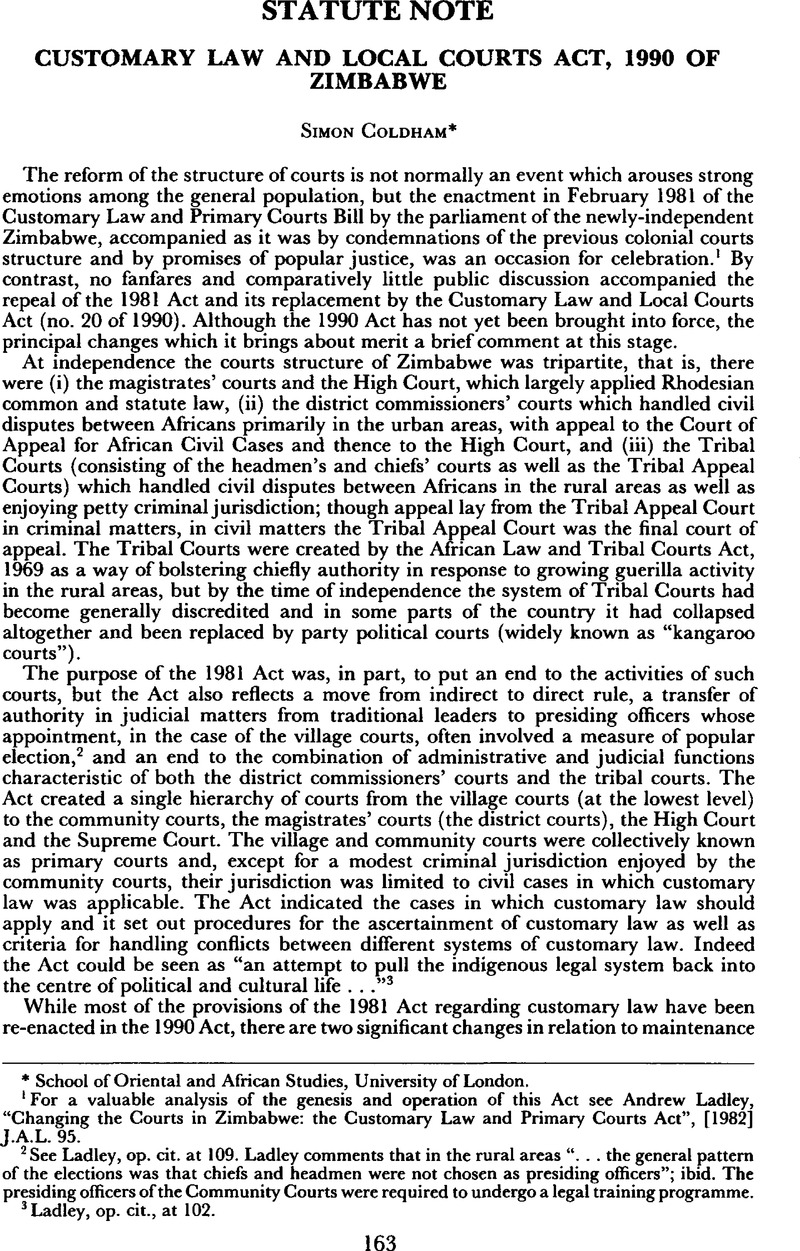Article contents
Customary Law and Local Courts Act, 1990 of Zimbabwe
Published online by Cambridge University Press: 28 July 2009
Abstract

- Type
- Statute Note
- Information
- Copyright
- Copyright © School of Oriental and African Studies 1990
References
1 For a valuable analysis of the genesis and operation of this Act see Ladley, Andrew, “Changing the Courts in Zimbabwe: the Customary Law and Primary Courts Act”, [1982] J.A.L. 95Google Scholar.
2 See Ladley, , op. cit. at 109Google Scholar. Ladley comments that in the rural areas “ … the general pattern of the elections was that chiefs and headmen were not chosen as presiding officers”; ibid. The presiding officers of the Community Courts were required to undergo a legal training programme.
3 Ladley, , op. cit., at 102Google Scholar.
4 S. 12(4)(a), inserted by s. 4 of the Customary Law and Primary Courts Amendment Act, no. 21 of 1982Google Scholar.
5 S. 6(3)(a) of the Maintenance Act (Chapter 35), introduced by the Customary Law and Local Courts Act, Sched., Part III, s. 4.
6 S. 12(4)(b), inserted by s. 4 of the Customary Law and Primary Courts Amendment Act, no. 21 of 1982Google Scholar.
7 S. 6(3)(b) of the Maintenance Act (Chapter 35), introduced by the Customary Law and Local Courts Act, Sched., Part III, s. 4.
8 Katekwe v. Muchabaiwa, S.C. Judgment no. 87/84 (unreported), discussed by Ncube, W. in [1983–1984] Zimbabwe Law Review 217Google Scholar. It was decided in this case that a father no longer had locus standi to bring an action for damages in respect of the seduction of his daughter who had attained the age of majority. Similarly, in Chihowa v. Mangwende, S.C. Judgment no. 84/87 (unreported), it was held that the respondent was rightly appointed the intestate heiress to her father's property.
9 Chiefs and headmen are appointed by the President and the Minister (respectively) under the Chiefs and Headmen Act (no. 29 of 1982). The chiefs have a combination of traditional and statutory functions and the headmen are responsible for assisting the chiefs in the discharge of these functions.
10 Under the 1981 Act only the village courts were required to use assessors. Seminars are to be organised to train chiefs and headmen on their new judicial role. Parliamentary Debates, 18 01, 1990, col. 2751Google Scholar.
11 S. 23. Where there is an appeal from a community court, the magistrates' court is required to rehear the case. Such a rehearing, though common, was not necessary under the 1982 Act
12 Customary Law and Local Courts Act, 1990Google Scholar, Sched., Part II, s. 4 which amends the Magistrates Court Act (Chapter 18).
13 A community court has jurisdiction over unregistered customary unions, whereas under the 1981 Act a community court had jurisdiction over marriages solemnised under the African Marriages Act.
14 “Customary Law and Local Courts Act, 1990, s. 15Google Scholar.
15 The Magistrates Court Act has been amended to enable magistrates' courts to hear customary law cases at first instance. Customary Law and Local Courts Act, Sched., Part II, s.l.
16 The Minister of Justice has indeed stated: “The advantages of these changes are that some experienced senior and provincial magistrates will now be able to preside over some of the more difficult cases based on customary law …”. Parliamentary Debates, 18 01, 1990, col. 2750Google Scholar.
- 1
- Cited by




